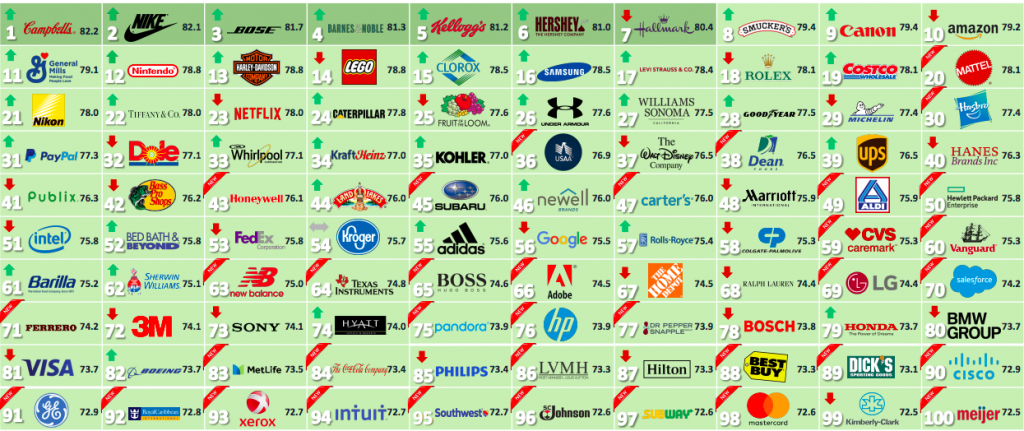Nike landed as the second most reputable U.S. company in Reputation Institute’s annual U.S. RepTrak 100 rankings. Nike was 40 in 2017.
Based on more than 52,000 individual ratings of companies during the first quarter of 2018, the survey quantifies the emotional bond stakeholders have with more than 880 leading companies, and how these connections drive supportive behavior like the willingness to purchase a company’s products, recommend the brand, invest or even work for the company.
The top 10 companies in RI’s 2018 US RepTrak 100 are:
- Campbell’s
- Nike
- Bose
- Barnes & Noble
- Kellogg’s
- Hershey’s
- Hallmark
- J.M. Smucker
- Canon
- Amazon
Six new companies entered the Top 10 this year, including Campbell’s, Nike, Bose, Kellogg’s, J.M. Smucker and Canon, and overall, 36 new companies have entered the Top 100 in this past year.
Other active brands making the top-100 list included Under Armour, 26; Hanesbrands, 40; Adidas, 55; New Balance, 63; and Dick’s Sporting Goods, 89. The full list is here.
Trends among successful companies demonstrate that brand strength, increasingly founded on the delivery of a brand promise, yields higher reputation and greater support among stakeholders, according to Reputation Institute. The Top 10 companies–nine of which are U.S.-based—all embody traditional American values and the underlying characteristics of success, stability and growth. A more vocal CEO also benefits a company’s reputation–including key dimensions of citizenship and governance.
The survey findings indicate that many companies are experiencing significant challenges. Macrotrends impacting corporate reputations in the U.S. have resulted in significant disruptions this year, with companies’ rankings changing by an average of 27 spots, revealing a significant erosion of trust and confidence in corporations and making earning stakeholder support more difficult.
Stephen Hahn-Griffiths, chief reputation officer at Reputation Institute, said, “The underlying reputation disruption we are seeing in the U.S. is driven by a crisis of trust. In an era of tweet ranting, fake news, data privacy breaches and questioning of company ethics, the trust in big companies has eroded in the past year. Companies that are most trusted garner a stronger reputation.”
While governance and citizenship–especially on the merits of fairness, ethics, positive influence on society and importance of products/services–have increased as reputation drivers in 2018 (collectively contributing to 51.9% of reputation), the relative importance of overall company performance have declined, with fewer companies perceived as embodying a sense of sincerity and genuinely caring, the absence of authenticity is fueling doubt among stakeholders. In a politically polarized environment increasingly centered around the credibility of information and authentic communication, we are seeing that corporate reputation and politics do mix, and can significantly impact corporate reputation.
Fast fallers in the US RepTrak rankings include Amazon, Apple and Facebook. Amazon is on the decline at #10 from being #1 in 2016 and #2 in 2017. Amazon’s largest declines are in the three CSR dimensions: workplace, citizenship and governance. Apple fell entirely from the Top 100 list in 2018 with an 11-point drop in RepTrak pulse score; last year Apple was #72. Facebook is also in reputational free-fall and experienced reputational declines across all dimensions, especially on the merits of governance.
Among industries, only three have strong reputation scores–including consumer, food and beverage and automotive. The majority of industries are in the average range. The telecom industry joins energy in the weak range, and the airlines industry has the largest pulse decline. Healthcare is the only industry to have a positive reputation movement since 2017–and is a faster riser in ranking.
















